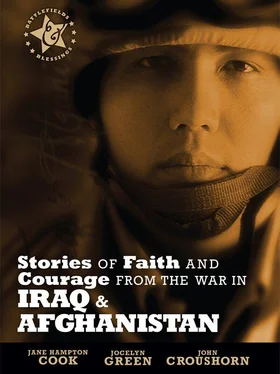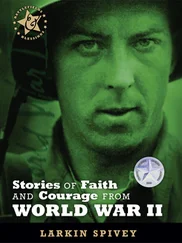McDougal learned from a British watch officer that because Britain is so small in landmass, that one newspaper in Britain can reach a tenth of the population there. “That was the beauty of working with foreign governments and foreign people on what we call a deck plate or grass roots level. I now understand why other countries do what they do.”
Little did he know that taking stock of these seemingly small cultural differences praying before meals and freedom of speech was preparing him for a moment requiring courage. He was building crucial relationships with the Brits that would enable him to stand firm in the future.
Prayer:
Keep me from being so self absorbed today that I miss discerning the needs of those around me.
“He gives wisdom to the wise and knowledge to the discerning.” (Daniel 2:21b)
January 22
BAD NEWS
Lt. Sean McDougal, United States Navy
Navy Lieutenant Sean McDougal was serving as a United States liaison officer as part of the British version of the Joint Operations Center at CENTCOM in Qatar on March 23, 2003. McDougal was watching the overhead 52-inch television screen when he and numerous Britons in the room saw a news report of an American service member who killed his commanding officer with a grenade. The incident took place at Camp Pennsylvania that was set up in Kuwait in a triangle formation with Camps New York and New Jersey.
Colonel Snider, the guy in charge of British forces, turned to me and said, “Sean, where is the camp’s location?” Colonel Snider sat at the corner of the room with his back to the wall so that no one could read his computer screen.
“I had the authority and training to know what I could and could not declassify to a foreign military such as Britain. I disclosed what I could.”
Five minutes later, a British air operations officer announced that a Tornado, a British jet, was missing. It was flying from Camp New York to Camp New Jersey.
McDougal put the pieces together. He had just viewed classified information that indicated the firing of a patriot missile from Camp New Jersey toward Camp New York, the opposite direction of the Tornado.
“I wrote a buddy of mine and asked, ‘Can the patriot shoot down an airplane?’” McDougal relayed that the answer was “yes.”
“I’ll never forget calling over the British colonel. ‘I hate saying this, but I think we shot down your plane,’” McDougal recounted.
“That was heinous. That was the worst day of the war for me,” McDougal said, “but, looking back, I’ve concluded that God gave me wisdom to put together what seemed to be two totally unrelated acts and figure out the truth about their missing plane. I was scared to death that I would say something wrong or embarrass our nation but I knew our ally had to know.”
The information was soon confirmed and relayed in the official briefing later that day. Further investigation revealed mistakes on both sides.
“Although I can’t prove it I know God was grooming me for other situations where I would have to give bad information to large groups and then stand fast.”
Prayer:
God, you are might in power and wisdom. You give courage in the most trying times, when we need it most.
“Praise be to the name of God forever and ever; wisdom and power are his.” (Daniel 2:20)
January 23
FROM FISHING VILLAGES TO PALACES
Lt. Sean McDougal, United States Navy
When the invasion phase of the war in Iraq ended in May 2003, many with CENTCOM returned to the United States. Others, such as Navy Lieutenant Sean McDougal and Air Force Major Randolph Winge (Troll) were given different tasks.
“My job was to help the Third Infantry Division take over the Navy portion of Iraq that is the port of Umm Qsar,” McDougal said. Umm Qsar is a fishing village that served as Iraq’s main naval base under Saddam Hussein’s regime.
When internal military politics prevented that plan from going as expected, McDougal decided to keep busy and productive by doing what he could. He employed his engineering and electrical skills. His diligence soon caught the attention of those in suits.
“What I ended up doing was sleeping in this giant building that needed a lot of repairs. I went around fixing swamp coolers giant five-foot diameter fans that rely on garden hoses to moisten and cool the air,” he explained.
“One night at 2 a.m. this gentleman came up to me. He wasn’t wearing a uniform, but a business suit. He asked me what I was doing,” McDougal said, explaining that he was fixing refrigerators that weren’t cooling properly.
“How do you know that?” the man asked.
“Sir, I’m in the Navy; my job is to do damage control.”
“Well, what’s that?”
“Sir, for example, if a bomb were to hit the corner of this building, my job would be to reroute the electricity, plumbing, air conditioning, and everything, put in temporary fixes, and then fix everything back up to normal specifications,” McDougal explained.
The next day, McDougal saw the man in the business suit walking and talking with his skipper at chow time. They spoke again.
The next day his skipper gave McDougal the news, “Sean, you and Troll are going to Baghdad.”
“Excuse me, what do you mean?” McDougal asked.
“Well, the ambassador asked for you.”
“What ambassador and what are you talking about?”
“Well, the ambassador you spoke with last night and today.”
The ambassador was Walter Slocum and he wanted McDougal and his buddy Troll to go into Baghdad and help fix up the palaces.
“The whole reason I went to Baghdad was because I was bored late one night and decided to help out the guys in the Third ID by fixing a refrigerator that wasn’t cooling their water bottles,” McDougal explained.
Diligence and hard work opened the door for McDougal to a new opportunity. He became part of the Iraqi Ministry of Defense, led by Slocum.
Prayer:
Thank you for the blessing you provide as the result of diligence and hard work.
“Do you see a man skilled in his work? He will serve before kings; he will not serve before obscure men.” (Proverbs 22:29)
January 24
Palaces and Mass Graves
Lt. Sean McDougal, United States Navy
“My collateral duties ended up being the major part of my job,” Navy Lieutenant Sean McDougal explained about his work in Baghdad in 2003.
McDougal’s Iraq experience was common. Often collateral or “side jobs” took precedence over designated responsibilities. McDougal described collateral duties this way: “If your main duty is to be a dad, your collateral duty might be taking out garbage.”
“My job was to fix up Uday Hussein’s palaces, mansions,” McDougal noted. However, because he had LIVE weapons training and had set up antiterrorism force protection for the Navy as the director for Schoolhouse training in Hawaii, he took on hefty collateral duties. He provided security for teams that “went out of the wire” and into Baghdad searching for evidence of embargo violations by Saddam Hussein. They were seeking proof that he had misused oil money.
One of McDougal’s collateral duties took him to a site he never imagined he would ever see: mass graves. They were looking for evidence of abuses.
What made these graves so secret was not the style of burying. These weren’t deep holes with mounds of bodies covered by several feet of dirt. Saddam chose distance, not depth, to bury evidence of his dastardly deeds. He picked remote locations in the desert, such as the site that McDougal visited about an hour outside of Bagdad, to hide his evil. Saddam had Iraqi soldiers buried in mass graves to hide the number of casualties in Iraq’s war with Iran. He or his sons also ordered thousands of Iraqis killed.
Читать дальше












